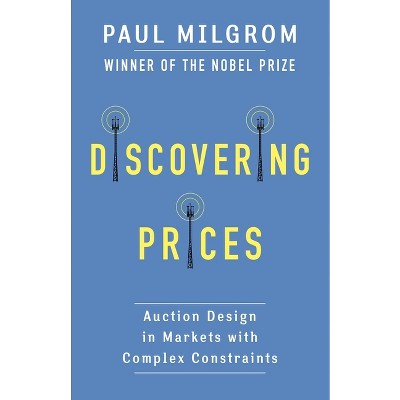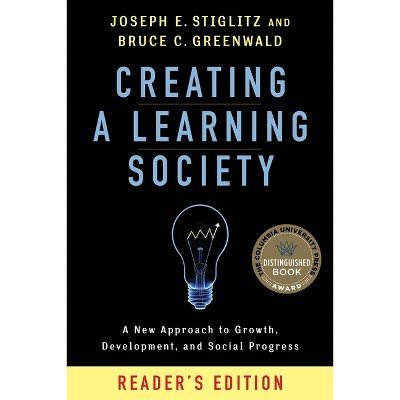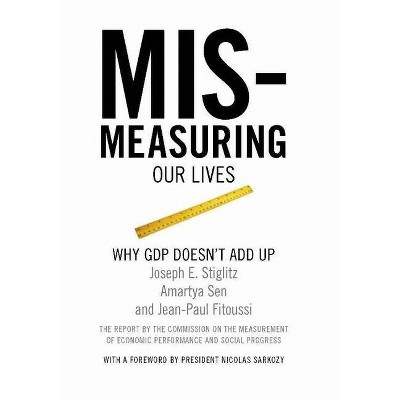Sponsored

The Arrow Impossibility Theorem - (Kenneth J. Arrow Lecture) by Eric Maskin & Amartya Sen (Hardcover)
$15.53Save $4.42 (22% off)
In Stock
Eligible for registries and wish lists
Sponsored
About this item
Highlights
- Kenneth J. Arrow's pathbreaking "impossibility theorem" was a watershed innovation in the history of welfare economics, voting theory, and collective choice, demonstrating that there is no voting rule that satisfies the four desirable axioms of decisiveness, consensus, nondictatorship, and independence.
- About the Author: Eric Maskin is the Adams University Professor at Harvard University.
- 168 Pages
- Business + Money Management, Economics
- Series Name: Kenneth J. Arrow Lecture
Description
About the Book
Kenneth J. Arrow's "impossibility theorem" was a watershed in welfare economics, voting theory, and collective choice. This book explores the implications of Arrow's theorem. Amartya Sen considers its value and limitations in relation to social reasoning, and Eric Maskin discusses how to design a voting rule that gets us closer to the ideal.Book Synopsis
Kenneth J. Arrow's pathbreaking "impossibility theorem" was a watershed innovation in the history of welfare economics, voting theory, and collective choice, demonstrating that there is no voting rule that satisfies the four desirable axioms of decisiveness, consensus, nondictatorship, and independence.
In this book Eric Maskin and Amartya Sen explore the implications of Arrow's theorem. Sen considers its ongoing utility, exploring the theorem's value and limitations in relation to recent research on social reasoning, and Maskin discusses how to design a voting rule that gets us closer to the ideal--given the impossibility of achieving the ideal. The volume also contains a contextual introduction by social choice scholar Prasanta K. Pattanaik and commentaries from Joseph E. Stiglitz and Kenneth J. Arrow himself, as well as essays by Maskin, Dasgupta, and Sen outlining the mathematical proof and framework behind their assertions.Review Quotes
Without hyperbole, no postwar intellectual of the first rank has done more good for more people--above all, many of the world's poorest--than Amartya Sen.--Boyd Tonkin "The Independent"
How vital it is to understand the ideas behind Kenneth J. Arrow's impossibility theorem if we want to design reasonably fair ways of coming to consensus decisions that take equitable account of individual preferences. This book is a marvelous introduction to the theorem, a keystone in the theory of social choice. We are treated to a discussion of that theory--its origin, background, and the challenges it points to--by some of its great architects.--Barry Mazur, Harvard University, author of Imagining Numbers
The pioneers of social choice theory give us lively, enjoyable, and stimulating lectures and exchanges of ideas. Their views, more than sixty years after the publication of Kenneth J. Arrow's theorem, are of paramount interest to anyone aware of the difficulties of collective decisions.--Marc Fleurbaey, Princeton University
What is Arrow's impossibility theorem? Why is it true? What are its implications for democratic decision making? Is its nihilism justified? These are the kinds of questions addressed in Maskin and Sen's masterful Arrow lectures. These lectures and the accompanying essays provide an accessible introduction to Kenneth J. Arrow's theorem for the neophyte and much food for thought for the cognoscente.--John A. Weymark, Vanderbilt University
About the Author
Eric Maskin is the Adams University Professor at Harvard University. He received the 2007 Nobel Memorial Prize in Economics (with L. Hurwicz and R. Myerson) for laying the foundations of mechanism design theory. He has also contributed to game theory, contract theory, social choice theory, political economy, and other areas of economics.
Amartya Sen is the Thomas W. Lamont University Professor and Professor of Economics and Philosophy at Harvard University. In 1998 he was awarded the Nobel Memorial Prize in Economic Sciences, and in 1999 he was awarded the Bharat Ratna, India's highest civilian award. He is also a senior fellow at the Harvard Society of Fellows; distinguished fellow of All Souls College, Oxford; and a Fellow of Trinity College, Cambridge. His books have been translated into more than thirty languages.Dimensions (Overall): 8.3 Inches (H) x 5.7 Inches (W) x .7 Inches (D)
Weight: .75 Pounds
Suggested Age: 22 Years and Up
Number of Pages: 168
Genre: Business + Money Management
Sub-Genre: Economics
Series Title: Kenneth J. Arrow Lecture
Publisher: Columbia University Press
Format: Hardcover
Author: Eric Maskin & Amartya Sen
Language: English
Street Date: July 22, 2014
TCIN: 87703535
UPC: 9780231153287
Item Number (DPCI): 247-06-5800
Origin: Made in the USA or Imported
If the item details aren’t accurate or complete, we want to know about it.
Shipping details
Estimated ship dimensions: 0.7 inches length x 5.7 inches width x 8.3 inches height
Estimated ship weight: 0.75 pounds
We regret that this item cannot be shipped to PO Boxes.
This item cannot be shipped to the following locations: American Samoa (see also separate entry under AS), Guam (see also separate entry under GU), Northern Mariana Islands, Puerto Rico (see also separate entry under PR), United States Minor Outlying Islands, Virgin Islands, U.S., APO/FPO
Return details
This item can be returned to any Target store or Target.com.
This item must be returned within 90 days of the date it was purchased in store, shipped, delivered by a Shipt shopper, or made ready for pickup.
See the return policy for complete information.











